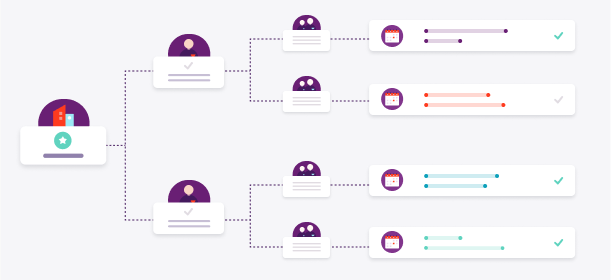Prior to the onset of the COVID-19 pandemic, a large portion of the international workforce was already working from home. To this day, the remote work trend shows no signs of abatement and continues to shape our new normal, with experts saying it’s likely to stay beyond the pandemic. In this context, it’s important for recruiters to devise and implement a well-researched plan that encompasses both the human and corporate aspects of remote work.
While some employees might be used to the telework model, others might still feel confused or apprehensive. In order to have a functioning remote team, you need to account for every teammate: those who are accustomed to this method as well as those who are still figuring it out, and those for whom this is a permanent decision as well as those who are eager to return to the physical office.
This article aims to guide and inform managers on which values to put forward, which attitudes to display and which approaches to favor when managing a remote team.
1. Set clear goals and expectations
A SMART goal incorporates these 5 essential criteria
.png)
The importance of motivation in a remote work environment is significant, and it is best displayed in the form of reachable objectives. In order to envision success and achieve it, it is imperative that workers from all levels of management define targets, be it for their work, their projects, their progress, their role within the company or their relationship with colleagues. These targets need to be realistic and attainable in a pre-established timeframe. They also need to be engaging and connected to the company’s mission.
Most of all, these individual and common objectives have to be measurable, as concrete and quantified results have been shown to motivate teams. Don’t let the distance keep you and your team from professional development opportunities. Think of ways to adjust your existing objectives to remote settings and brainstorm new remote-specific goal ideas, such as to give feedback or show appreciation to at least one person a day.
And keep in mind, as in all things, change is to be expected. Instead of pursuing a static and stubborn agenda, dare to reflect on the past with a fluid and flexible perspective. As circumstances evolve and new elements come into play, don’t be afraid to review and adjust your ambitions, recalibrate your approach to that of your team’s, or divide big goals into smaller tasks if need be. Having a long-term vision that accommodates its elements in the face of the expected is the key to a meaningful goal-setting strategy.
Set multi-level targets and objectives

2. Encourage team spirit to create a bond
One of the most common challenges of the remote environment is the difficulty for coworkers to create and maintain bonds with one another. On this note, our Talent & Culture Specialist Evelyne Lafond highlights the importance of interpersonal relationships in the virtual workplace:
"Creativity, adaptation and initiative are the watchwords when it comes to managing a remote team. Additionally, team spirit and empathy are skills that we as managers not only have to demonstrate but also cultivate and encourage in all tiers of our organization."
Foster cooperation among colleagues

Team building builds trust, encourages communication and increases collaboration, ultimately resulting in higher productivity levels. In order to enhance the feeling of camaraderie among your coworkers, you can organize different types of remote team bonding activities. For example, you can schedule game nights or virtual happy hour events. Once these events become part of a routine, your team will start to await them with excitement, which can motivate them in a proactive manner. Regardless of the exact game or activity you choose to go with, the goal is for participants to feel united and valued beyond the obligations of their everyday roles.
Take full advantage of modern technology and host unique virtual events
.png)
3. Display transparency at all levels
During times of transition and uncertainty, it is particularly important for managers to demonstrate a commitment to transparency. Transparency means being honest about the company’s current and future state, it means sharing information not only to key stakeholders but to all staff members in a clear and honest manner. In this ever-changing remote landscape, your communications should be frequent and straightforward, to give every employee a coherent idea of current corporate affairs and for them to know what to expect and how to plan accordingly.
When your messages are honest, interactive, realistic and optimistic, your coworkers feel like they are in good hands and are more likely to be transparent themselves. Concretely, town hall meetings are a good way for all members of a company or team to receive valuable information from upper management. You can easily set one up virtually and make it a habit.
Also, in addition to obvious social distancing precautions, a transparent manager should make sure everyone’s mental health and well-being is up to par. They say prevention is the best cure, so don’t hesitate to arm your fellow employees with virtual healthcare apps and resources to help reduce stress and identify problems at their core. In this virtual age, promoting employee wellness in a resourceful and transparent manner should be at the top of your priority list.
Conclusion
A remote team is best managed when social aspects such as the need for community and recognition are valued. Whether you were pushed into confinement by the pandemic or willfully chose the route of telework out of convenience, you need to make sure your team is equipped for it both in terms of resources and in terms of mental fitness.
As seen above, a research-based strategy to ensure remote productivity is to set concrete targets, foster relationships and display total transparency. If you wish to extend your knowledge on the topic covered, are curious about the process of hiring for remote work and want to discover expert tips on selecting the best remote candidates, check out this article: Scouting for Remote Candidates: Look for These 4 Skills.
Talent.com is a leading job search and recruitment platform available in 78 countries. We help you post jobs, craft personalized digital campaigns and track performance to reach your hiring goals. On this blog, we use our industry expertise to inform and guide you in the development and implementation of your recruitment strategy. Follow us on LinkedIn or subscribe to our blog to get the latest scoop on job seeker interest, hiring news, job market trends and talent acquisition technology. Looking for advice to maximize your recruitment ROI? Contact our team of experts today.
Related articles
-
Recruitment Strategy
Scouting for Remote Candidates: Look for These 4 Skills
Across various professional sectors, remote work opportunities have proliferated over the past few years. This trend has been reinforced by the onslau...
-
HR Marketing Technology
Innovative Ways for SMBs to Break Down Remote Recruiting
Now that hybrid work is the new normal for many, businesses of all sizes are looking for hybrid and remote employees. And it’s no wonder, since the be...
-
HR Marketing Recruitment Strategy Case Study
Health and Wellness Leader Partners with Talent.com to Diversify Their Candidate Pool
European Wax Center (EWC) is part of a national franchise in the health and wellness industry. One of its owners, with twelve stores all located withi...
